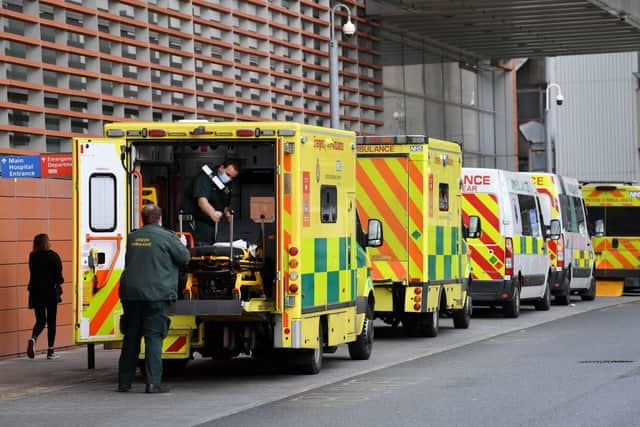UK patient, 59, with ‘longest case of Covid’ finally cleared of virus after 411 days after cocktail of drugs
and live on Freeview channel 276
A patient who is thought to have had Covid-19 for longer than anybody else in the world and survived has finally been cleared of the virus after 411 days, doctors report.
The man, now 59, who has a weakened immune system after a kidney transplant, first tested positive for coronavirus in December 2020. Despite his symptoms going away, he continued to test positive intermittently until January 2022, according to the research, published in the journal Clinical Infectious Diseases.
Advertisement
Hide AdAdvertisement
Hide AdExperts from Guy’s and St Thomas’ NHS Foundation Trust, London, and King’s College London said the 59-year-old was unable to get rid of an early variant of the virus due to a weak immune system.
The unnamed man is thought to be one of the longest living patients with a persistent Covid infection. A previous patient treated by the same team tested positive for Covid for 505 days but subsequently died.
In the latest case, medics detected the man’s ongoing infection by analysing the genetics of the strain of the virus he was carrying, and determined he had an early variant of the original Wuhan strain, which had long since been overtaken by Alpha, Delta and Omicron in general circulation.


After identifying the variant, medics gave the man a cocktail of neutralising antibodies (Regeneron), the same drug cocktail that helped former US President Donald Trump to fight the illness. Regeneron is known to be effective against early Covid variants and finally allowed the 59-year-old to clear his body of the virus.
Advertisement
Hide AdAdvertisement
Hide AdHowever, the medics warn that the emergence of new variants of Covid has meant neutralising antibody treatments are now largely ineffective. Cases of persistent infection are different to Long Covid, where a patient suffers from symptoms for several weeks and months but does not test positive.
The team are now calling for more research into antibody treatments for persistent Covid cases and campaigners have called for a new medication, Evusheld, to be made available in the UK and Europe.
Dr Luke Snell, from Guy’s and St Thomas’, said: “Some new variants of the virus are resistant to all the antibody treatments available in the UK and Europe. Some people with weakened immune systems are still at risk of severe illness and becoming persistently infected. We are still working to understand the best way to protect and treat them.”
Mixed picture’ for Covid infections in UK
The latest rise in Covid infections in England appears to be levelling off but virus numbers are still increasing in Scotland and Northern Ireland, figures from the Office for National Statistics (ONS) show. Wales is the only part of the UK seeing a clear fall in infections, according to the latest figures.
Advertisement
Hide AdAdvertisement
Hide AdThe current wave of the virus is being driven by a number of Covid variants that have been circulating for several months, including Omicron BQ.1 and XBB. These strains are being monitored for their potential to spread rapidly, but have not been designated variants of concern, the UK Health Security Agency said.
In the week to 17 October an estimated 2.05 million in the UK testsed positive for Covid, broadly unchanged on 2.01 million in the previous week, according to the ONS. This is still way below the peak of nearly four million reached in early July, during the Omicron BA.4/BA.5 wave. The rate of increase in UK-wide infections has recently slowed, with the latest total up just 2% on the previous week.
Kara Steel, ONS senior statistician for the Covid-19 infection survey, said the new figures show a “mixed picture”. She explained: “Though infections appear to have slowed in England and are now declining in Wales, they are increasing in both Northern Ireland and Scotland.
“Infections are highest in those aged 50 and over in England, though there has been an increase in secondary school aged children. It remains too early to say from the data whether we are seeing a turning point in the level of infections – which remain high across the countries.”
Comment Guidelines
National World encourages reader discussion on our stories. User feedback, insights and back-and-forth exchanges add a rich layer of context to reporting. Please review our Community Guidelines before commenting.
